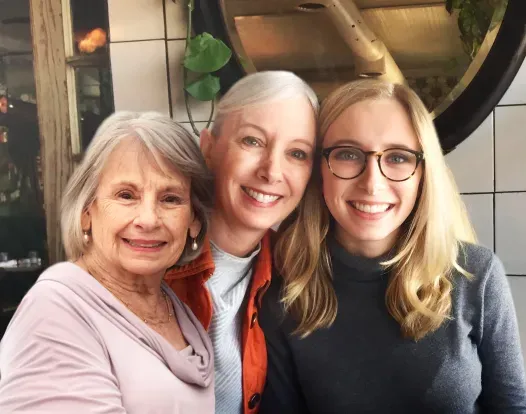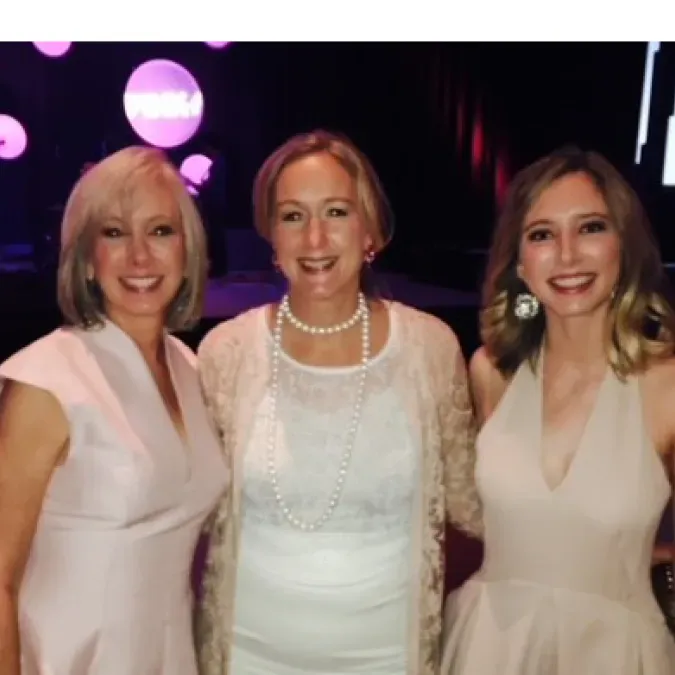Learn more about Hattie Sherman, a third-generation breast cancer survivor.

Fortunately, as advances in cancer research continued, each generation of Hattie's family experienced improved treatment options.
Image (left to right): Mary Ann (grandmother), Molly (mother), Hattie

At 27, Hattie moved back to her hometown of Austin, Texas, for a new job opportunity. When, shortly after moving, she felt a hard mass in her chest, her mother—wary from her own experience as a breast cancer survivor—encouraged her to get it checked.
She decided to see her mother’s oncologist, Debra Patt, MD, PhD, MBA, a Conquer Cancer grant recipient and Molly’s oncologist. After multiple tests, Dr. Patt diagnosed Hattie with triple-negative breast cancer.
The good news: It was treatable.
“I’d watched my mom and grandmother go through the same process,” says Hattie. “They went through their treatments with immense positivity, and so I think it was hard not to attack my diagnosis with the same mental state.”
Sustained advancements in cancer research helped Dr. Patt detect Hattie’s cancer at an early stage and determine the disease could be removed with an aggressive type of surgery. Molly, who had experienced surgery for breast cancer, provided her daughter with empathy and support at every step.
“I think having someone you love and care about and admire, in this case my mother ... of course it has an effect and gives you kind of that extra push to say, ‘OK, this is do-able. This is something I can conquer,’” says Hattie.
Dr. Patt drew from immense progress in cancer research – advancements made since the time Molly had been in treatment – to inform Hattie’s care plan.
“When Molly was diagnosed and we tested her, our best assessment was that there was not a heritable risk that we identified. And when Hattie then contributed to that picture, we really changed our thinking,” says Dr. Patt. “The difference between that timespan is that additional research – that had to be funded – contributed to our understanding.”
Now a third-generation breast cancer survivor, Hattie raises awareness on the intergenerational impact of cancer research. She has a twin sister, Mary Alice, and a pair of younger twin sisters, all of whom face similar risks for hereditary breast cancers. Hattie, her mother, and grandmother each received different breast cancer diagnoses, so she wants her sisters and people with family histories of cancer to understand their unique risks and endorse donor-funded research.
“[Just] because it’s hereditary doesn’t mean your cancer type will necessarily be the same,” says Hattie.
Sustained, long-term support for cancer research enables improvements in screening and treatment to continue for people like Hattie, her family, and every person who has been – or may one day be – touched by cancer.
“We want to be able to identify exactly what we think is [causing cancer], so we can then test for it and prevent disease in everyone else. I think that comes over time, really through investments in research, and that’s why I feel so strongly about Conquer Cancer,” says Dr. Patt. “I think why Molly and Hattie have been so great about being advocates and supporting cancer research is because we know that through investments in research, we have better answers, and we can empower [people] to have better lives.”
With each new generation comes new cancer research and programs, like the work we’re funding at Conquer Cancer. This work continuously improves the diagnostic tools and treatments available to patients like Hattie and her family, giving us all a greater chance of conquering cancer.
Related
Listen to Hattie speak with host Dr. Mark Lewis, Dr. Patt, and her mother in this podcast episode of Your Stories.
